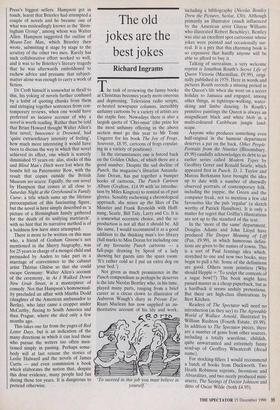On the right side of the Thirties
Christopher Hawtree
RED LETTER DAYS by Andrew Croft
Lawrence &Wishart, £19.95, pp. 352
ubtitled 'British fiction in the 1930s', this is a study of some novels published in that decade. Not that the opening pages suggest as much. Three sentences in, and there come such remarks as 'ten years of Thatcherism' and 'the continuing ideolo- gical and political struggle', not to mention regret that 'the victory of 1945 slips away into legend'. There is always something faintly absurd about literary critics — Raymond Williams passim — who imagine that their task, performed in a cushioned chair, is a means of expressing solidarity with those who toil on a checkout or beside a conveyor-belt to the sound of Roger Whittaker from loudspeakers overhead.
Such preoccupations litter the subse- quent pages, which — as Andrew Croft admits — are themselves something of a muddle. This was perhaps inevitable, for he has performed the valuable task of disinterring scores of novels that do not fit into the patterns and groups contrived by those who come along after the event. It does not lessen Auden's pre-eminence as a poet to doubt whether the decade's literary work was a product of his 'generation'. Matters were more multifarious than that: as Evelyn Waugh later remarked, there were many who 'worked alone in quiet self-sufficiency'.
If anything links those who figure in Dr Croft's study, it is disquiet. Here are novels in which unemployment is little better than going down the mines, those who worked the middle shift being known as 'afternoon men' — a world away from the eponymous Anthony Powell novel. There are few more effective accounts of such indignity than Walter Brierley's Means-Test Man. It is a tightly organised work of eight chapters which describes the week during which a family awaits the arrival of a new means test inspector whose reputation for severity has already gone before him. None of Brierley's other novels is as good. The reason for this has only lately become apparent. A Listener piece by him about unemployment had been read by John Hampson whose harrowing 1931 account of a Derbyshire pub, Saturday Night at the Greyhound, had been one of the Hogarth Press's biggest sellers. Hampson got in touch, learnt that Brierley had attempted a couple of novels and he became one of what was misleadingly known as the 'Birm- ingham Group', among whom was Walter Allen. Hampson suggested the outline of Means-Test Man, which Brierley then wrote, submitting it stage by stage to the scrutiny of the other two men. Rarely has such collaborative effort worked so well, and it was to be Brierley's literary tragedy that he was afterwards emboldened to eschew advice and presume that subject- matter alone was enough to carry a work of fiction.
Dr Croft himself is somewhat in thrall to this, his yoking of novels further confused by a habit of quoting chunks from them and stringing together sentences from con- temporary reviews, when one would have preferred an incisive account of why a novel is worth reading. Rather than be told that Brian Howard thought Walter Allen's first novel, Innocence is Drowned, had 'quite extraordinary intensity of feeling', how much more interesting it would have been to discuss the way in which that novel achieved its effect, one which is scarcely diminished 55 years on: alas, stocks of this and Blind Man's Ditch were lost when the bombs fell on Paternoster Row, with the result that copies outside the British Museum are scarce. Equally, the one novel by Hampson that comes at all close to Saturday Night at the Greyhound is Family Curse: a title which sums up the lifetime preoccupation of this fascinating figure, but the novel is here simply described as 'a picture of a Birmingham family gathered for the death of its unifying matriarch', with no hint that its narrative method is of a boldness few have since attempted.
There is more to be written on this man who, a friend of Graham Greene's not mentioned in the Sherry biography, was for 25 years in charge of a mongol child and persuaded by Auden to take part in a marriage of convenience to the cabaret artist Therese Ghiese so that she could escape Germany: Walter Allen's account of the ceremony, in As I Walked Down New Grub Street, is a masterpiece of comedy. Not that Hampson's homosexual- ity precluded an affair with Martha Dodd (daughter of the American ambassador to Berlin), who later came a cropper under McCarthy, fleeing to South America and then Prague, where she died only a few months ago. This takes one far from the pages of Red Letter Days, but is an indication of the many directions in which it can lead those who pursue the writers too often men- tioned simply in passing. Perhaps some- body will at last reissue the stories of Leslie Halward and the novels of James Curtis — and even commission a book which elaborates the notion that, despite this dour evidence, many people had fun during those ten years. It is dangerous to pretend otherwise.



























































 Previous page
Previous page